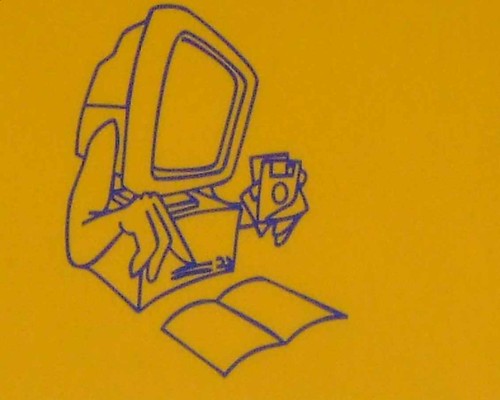 On this 1 day course, Tee Morris introduced participants to blogging with Wordpress; Youtube; Facebook and Twitter. Technical problems, with some PCs not logging on to start with, and WELTEC's firewalls and security settings caused frustrations to participants and presenter alike. Partly as a result of this, we spent almost all the morning setting up an account on wordpress.com, and learning how to use some of its features.
On this 1 day course, Tee Morris introduced participants to blogging with Wordpress; Youtube; Facebook and Twitter. Technical problems, with some PCs not logging on to start with, and WELTEC's firewalls and security settings caused frustrations to participants and presenter alike. Partly as a result of this, we spent almost all the morning setting up an account on wordpress.com, and learning how to use some of its features.Tee feels that blogger, which we use at National Library, is the easiest blogging platform to use. He prefers wordpress, as wordpress.org can be much more customisable, with individuals being able to change its settings and add their own features to their blogs. Wordpress.com, which we used in the course is good for beginners.
Tee recommends that blog entries be no more than 500 words, and feels that any longer can be a bit indulgent. (Oh dear, how many am I up to now...)
When looking at Youtube, Tee showed us his videos there, or tried his best to. I'd like to look at these at some stage, as Tee Morris has a strong background in this area, and has written books on Podcasting. A new book of his "All A Twitter" is about to be published, and he's also a Science Fiction author. Tee definitely has excellent "geek" qualifications, and answered questions thoughtfully, showing his background and knowledge about web 2.0. Come to think of it, I don't think he mentioned the term web 2.0 once during this course, which is a refreshing change!
Here are his videos:
ANTI-Social Media: Part One — Blogging
ANTI-Social Media: Part Two — Facebook
ANTI-Social Media: Part Three — Twitter
Tee talked about the value of twitter as a marketing tool, and discussed his relationship with Air New Zealand last year. At one stage, Air NZ sent out a tweet saying that their thoughts were with the people in Gisborne after the earthquake. Tee twittered back "what happened," got more information from Air NZ, then asked if the Air NZ twitterers were OK. They replied that they were fine, as they are based in San Francisco. Tee discussed with us the power of being able to send a message to so many people at once, and then quickly reply to Tee, and have a conversation on the subject. Last year twitter traffic increased 750%.
He said that he is recent and reluctant FaceBook user, being a "recovering" MySpace user. Facebook can be very powerful as a networking tool. Tee was, for example, able to contact an old university friend, who has become an actress, and successfully ask her to play a small part in one of his podcasts. You can create groups for specific communities of interest (click on the groups icon, right at the bottom of the FaceBook screen). However, he gets fed up at all the requests, for example people "poking" him, or sending him some silly survey.
Tee feels that Twitter and Facebook are currently neck-in-neck as the most popular social networking application. This made me think, that if we (SYNZ) are serious about using social networking tools, we should have a presence on these.
- you've got to get past the "higher-ups" who don't understand social media
- IT people can be a problem. They often won't allow access.
- Its difficult to decide where social media falls - is it PR, advertising, IT - its all three.
Tee suggested having a social media plan. As an example, he talked about a plan he had developed for an educational institution he was working with. The plan included initiatives such as having a blog which discussed classes on this week; a 5 minutes "free-for-all" podcast each week where students could put their 2c worth in; a twitter quick tip sent to students once a week; and having a short video with a specific topic on youtube each week. You might build up the plan gradually, eg we will do this for the first 6 months, then add this initiative, then this etc.
Oops, 709 words - sorry Tee!

